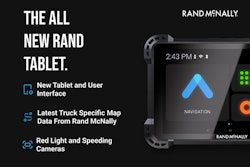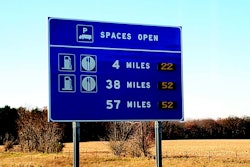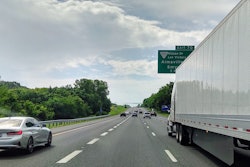The results are in: Professional drivers don't like to pay for parking, most don't do much of it, and they don't think too highly of attempts to convert to paid spots previously free, if somewhat inconsistent, unreliable, and unorganized parking opportunities.
That's as indicated by two rounds of polling of Overdrive's mostly owner-operator readership. Polling followed reporting on company driver Michelle Kitchin's experience finding about a quarter of the spots at a Flying J location she's frequented for decades went from free spots to unreservable credit card-only spots paid through the Truck Parking Club app.
Truck Parking Club, which started out as a way for land owners to "monetize vacant lots" with truck parking reservations, had "crossed the line," according to Kitchin, when instead of adding new spots previously unavailable for truck parking, they took existing free truck parking and paywalled it behind the app. Further, Kitchin couldn't spend her hard-earned Flying J points on a TPC spot there, meaning she'd have to pay cash.
Truck Parking Club Founder Evan Shelley countered that his organization is adding thousands of previously unavailable spots, for the good of all drivers and owners, and that operators of all stripes need to compensate land owners for their stays. That's a summary of what each of them said, at least. To get the full story, follow this link.
[Related: Truck Parking Club turns free spaces paid: Is this the future of truck parking?]
The business case for land owners to monetize there lots with truck parking has been clearly outlined by Shelley and company, so Overdrive polled its audience of pro drivers to find out what they made of it.
First off, a look at how often owner-operators and other drivers pay for parking.
"A significant part of our business is helping drivers get parked for multiple days, weeks or months, something you cannot do at rest areas and truck stops," said Shelley. The small 5% of respondents to the question above who had a predictable need such that it justified a weekly/monthly/annual payment, though, could underscore that the biggest needs sit elsewhere for most owner-operators when it comes parking needs on unpredictable timetables and locations.
We've asked readers the above question before -- since 2019, percentages of respondents have shifted considerably in some areas.
Owner-operator Chris Thomas, also a social media ambassador for the Truck Parking Club company, said it's become something of a bragging point among owner-ops to note how often you park for free, and how good your own secret spots are.
But companies like Truck Parking Club seem to fundamentally disrupt that status quo by taking some of those secret spots, onboarding the landowners, and advertising them on the app.
Kitchin felt drivers, particularly company drivers who won't get reimbursed, are getting pinched in the shift. That's especially true, she said, when it comes to TPC-managed spots at truck stops.
When the company pitches additional revenue streams to land owners, that revenue will come out of the pockets of operators of all stripes. Shelley and company believe in general their strategy is a net positive for overall available parking capacity, yet the notion of adding capacity through advertising of new pay-to-park opportunities didn't sit well with the owners and operators in Overdrive's audience.
Owner-operator Jayme Anderson said that he and his partner spend $3,000 to $4,000 a week at truck stops " buying fuel and everything I need to survive out here."
Anderson bristles at frequent posts on social media platforms by Truck Parking Club and affiliates, selling their spots to drivers, posting memes, making small talk. "Don’t come in like you’re trying to help drivers when you’re buying up free parking spots," he said. "They're feeding off the truck driver, like we're everybody's piggy bank." This opinion, which he's also expressed online, earned him jeers from Truck Parking Club supporters, some of whom are not current drivers.
"People that are trolling and clowning and being kids," he said, "it makes me sick to my eyeballs. I went off on them."
In the viewpoint poll (results above), the second-most-common response, with about 15% of the total, endorsed the view that pay-to-park just won't work. Too few truckers, those respondents noted, would ever get behind paid parking. "I myself don’t have a problem losing a few driving hours to have free parking to save a buck," noted one commenter, who blamed a lot of the truck parking issue on time constraints further constrained by mandated use of electronic logging devices.
TPC's Evan Shelley responded to this notion directly, citing some parking data as evidence: "Our focus and mission is to help truckers save time and fuel by efficiently finding and reserving truck parking across the U.S. The average driver takes 50-plus minutes to find parking on a daily basis," a reference to a 2016 report, with an update in the works, by the American Transportation Research Institute. Shelley continued: "We want to help reduce that to 10 minutes or less by providing thousands of new parking options, ultimately saving the drivers money because they can get further down the road."
How long would you drive to avoid spending $15-$40 on parking? Would you risk a ticket or a boot to avoid paying?
Shelley and parking-reservation proponents drive a hard bargain there.
[Related: Overdrive readers diverge on the value of a parking reservation]
The next most common respondent group (about 11% of the total) Shelley might not even have to persuade, as they're already in his camp. That group selected "Probably serves us right -- too many drivers treat parking lots like trash bins."
It's hard to deny the enormity of the problem on some lots. That heavy vehicles can quickly wear out paving, too, remains parked neatly between the lines, well beyond dispute. Even Shelley's most charged critics admit that many drivers do take advantage of free parking in a variety of ways. "There's no such thing as a free lunch," said Shelley. "Any private sector solution to a problem has to make money to survive, just like any publicly funded solution has to take taxpayer money to survive."
The next most popular response, with around 10% of the total, viewed pay-to-park as something of a necessary evil.
Alongside the paid/free debate, commenter Richard Davis made a case for truck parking as a public responsibility. Regulators have influence in all manner of aspects of a truck driver's life and business, from "how many hours a driver can drive" to how long breaks have to be, maintenance, health and more, Davis noted. "All these regulations are supposedly for safety," yet what could be more safety-critical than a "free, safe place to park"?
Davis argued for "large truck-only rest areas, like service plazas," to be "built with food courts and showers in high-traffic areas." With competition, he felt, "maybe then truck stops will fight for trucks and drivers' business again."
Shelley supports government building more parking, he said, but seemed to think it would be a bad idea to hold your breath while waiting for that to happen. "We aren't against more free parking, but if you run the numbers it's going to take billions of dollars and decades to make a dent," he said. "Truck Parking Club's solution is more immediate and does not have to be used if the driver doesn't want to."
An Overdrive review of government-created parking in 2023 found billions in federal, state and local money potentially available for the purpose, but only a precious few hundred lines actually sprayed on pavement.
[Related: How to fight for your right to park the truck]
Just about 1 in 10 poll respondents (9%) underscored real value in the ability to reserve a parking spot in advance, noting they were happy to pay in those cases. About 93% of Truck Parking Club's spots do offer the reservation opportunity.
The spot Kitchin encountered, and many of the TPC spots at big name truck stops, however, do not.
On that front, Shelley had something of an update.
"We are actively talking with Pilot about integrating their points program" at such locations, he said, to allow for loyalty points to be used to pay for space. "The technical side of things is the hard part. If we could snap our fingers and integrate we would do it immediately. It's a net positive for drivers and Truck Parking Club, so we want it done ASAP too."
Ultimately, truck parking is something of a raw issue among working haulers, a pox akin to housing insecurity for a hardworking group of people. It's a stain on the nation's infrastructure that truckers struggle to park to meet regulatory rest requirements.









